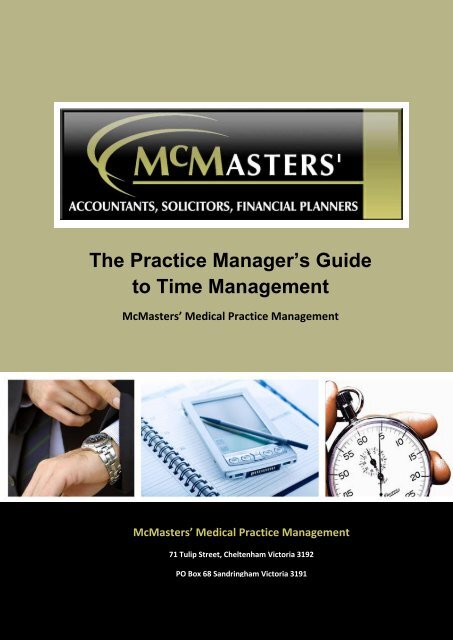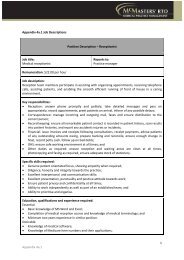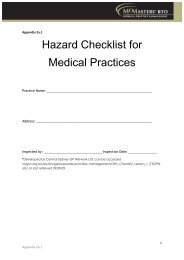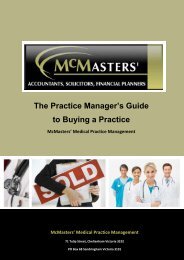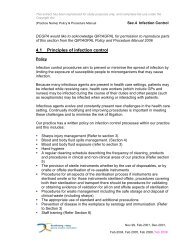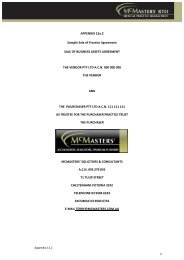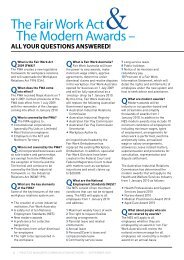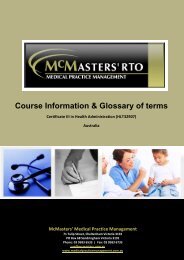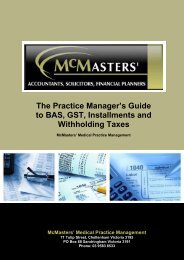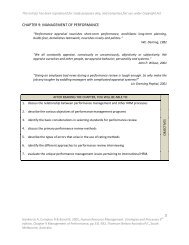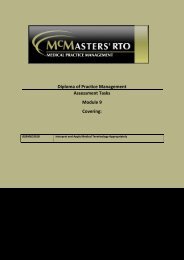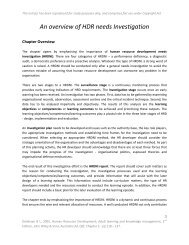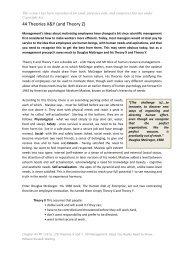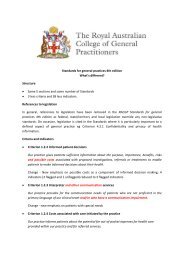The Practice Manager's Guide to Time Management
The Practice Manager's Guide to Time Management
The Practice Manager's Guide to Time Management
You also want an ePaper? Increase the reach of your titles
YUMPU automatically turns print PDFs into web optimized ePapers that Google loves.
<strong>The</strong> <strong>Practice</strong> Manager’s <strong>Guide</strong><strong>to</strong> <strong>Time</strong> <strong>Management</strong>McMasters’ Medical <strong>Practice</strong> <strong>Management</strong>McMasters’ Medical <strong>Practice</strong> <strong>Management</strong>71 Tulip Street, Cheltenham Vic<strong>to</strong>ria 3192PO Box 68 Sandringham Vic<strong>to</strong>ria 3191Phone: 03 9583 65331
<strong>The</strong> <strong>Practice</strong> Manager’s <strong>Guide</strong> <strong>to</strong> <strong>Time</strong> <strong>Management</strong>Introduction<strong>The</strong> <strong>Practice</strong> Managers’ <strong>Guide</strong> <strong>to</strong> <strong>Time</strong> <strong>Management</strong> has been developed <strong>to</strong> assist both doc<strong>to</strong>rs andpractice managers better utilise the time allocated for tasks. It contains numerous practical tips andadvice and identifies the main issues connected <strong>to</strong> successfully running the practice. It has beenidentified as an area where practice managers and doc<strong>to</strong>rs alike have a keen interest, and a lot ofimportant information is contained in the guide.<strong>Time</strong> is allocated <strong>to</strong> each of us equally. Sixty minutes an hour, twenty-four hours a day, seven days aweek for fifty-two weeks in a year. No one gets any more or any less than anyone else. Wasted timecan never be reclaimed. However, there is always <strong>to</strong>morrow: no matter how time is mismanaged<strong>to</strong>day, there is always a chance <strong>to</strong> do better <strong>to</strong>morrow.This guide introduces the concept of time management for doc<strong>to</strong>rs and practice staff. It identifiesareas where busy professionals can better balance the demands placed upon them, and offersinsight in<strong>to</strong> crucial skills needed <strong>to</strong> manage time issues better. This module will assist both doc<strong>to</strong>rs2
and practice managers <strong>to</strong> utilise their time better, increase productivity and achieve a happier andless stressful lifestyle.Topics included in this module include:Reasons for time management strategies;<strong>Time</strong> management strategies and techniques;Prioritising;Self discipline; andDelegation.Further reading is encouraged on the <strong>to</strong>pics and these will be identified throughout the module.3
14.1 A TIMELY INTRODUCTIONDoc<strong>to</strong>rs probably do not see themselves as “executives”. <strong>The</strong> word "executive" conjures up imagesof middle level managers, driving company cars <strong>to</strong> company offices, <strong>to</strong> carry out or create companypolicies for sales, production, and employment. Hospital management, the person next door, or abrother in law is an “executives”, not a doc<strong>to</strong>r.Peter Drucker, the most credible of all management experts, disagrees. He defines “an executive” as:... “a knowledge worker who makes decisions, controls the allocation of resources within anorganisation, and is responsible for the results of the organisation 1 .”Virtually all doc<strong>to</strong>rs and practice managers are executives under Drucker’s definition, however,many doc<strong>to</strong>rs and practice managers do not see themselves this way. Doc<strong>to</strong>rs and practicemanagers are entrepreneurs, using capital <strong>to</strong> run businesses, responding <strong>to</strong> the market forces, whichinclude competition, <strong>to</strong> generate a profit. <strong>The</strong>refore, time management, the productive use of time,is a crucial skill. It is also the only finite resource we have.This skill is particularly relevant where doc<strong>to</strong>rs face significant claims on available time, other thanfrom patients. <strong>The</strong>se could include pressure from family and friends. It should be remembered thatmany doc<strong>to</strong>rs own their own businesses: therefore, there is a much greater incentive <strong>to</strong> managetime well. It is the practice results that are being improved, for their own benefits and interests, notthose of anonymous shareholders.<strong>The</strong>re is only so much time available, so it should not be wasted. This means making sure time isspent productively, by allocating it in line with personal and business priorities and objectives. <strong>The</strong>manner in which a doc<strong>to</strong>r manages his or her time has a direct impact on the practice, as it affectsthe number of patients the doc<strong>to</strong>r can treat, and the level of service that doc<strong>to</strong>r can provide <strong>to</strong> eachpatient. As the practice manager role is <strong>to</strong> reduce the principal doc<strong>to</strong>r’s involvement in alladministrative and managerial aspects of running the practice, it is important that practice managersassist doc<strong>to</strong>rs with time management, as well as manage their own tasks efficiently.Why time should be managed betterAs a general rule, doc<strong>to</strong>rs are good time managers. <strong>The</strong> economic and physical logistics of practicemean most doc<strong>to</strong>rs are very focused on seeing patients: a long line of patients in the waiting roomtends <strong>to</strong> distract thoughts <strong>to</strong> how <strong>to</strong> deal with a lot of work in a short time, yet still achievemaximum efficiency and effectiveness. Years of training in a demanding academic environment alsohelps develop intuitive time management skills.<strong>Time</strong> management methods should not be perceived as a magic wand <strong>to</strong> convert a doc<strong>to</strong>r’s day froma hurried experience, balancing loads of equally urgent tasks, <strong>to</strong> a serene experience whereeverything runs smoothly and without hiccups. That is an unrealistic expectation.1 Butterworth Heineman, 1967, <strong>The</strong> Effective Executive, Peter Drucker, pages 7 <strong>to</strong> 8.4
AN EXAMPLEAssume that just one hour a day, or five hours a week, can be saved by improving timemanagement. Add, say, five hours a week for say, fifty weeks, and the equivalent of more than fivefull working weeks are wasted each year. What could be done with an extra five weeks a year?Answer: see more patients and make more profit, presumably an extra 20%. (Yes, that’s right, anextra 20%). Fees will go up by 10% assuming a 50-hour week, but costs should virtually not go up atall. Assuming costs of 50%, this means profit will go up by 20%. Or more. Alternatively, the sameamount of work could be done, and an extra five weeks could be spent on the beach over summer.Or a bit of both could be achieved.This is why time should managed better. <strong>The</strong>re are two classic books relating <strong>to</strong> the area of timemanagement, which will be referred <strong>to</strong> in this module. <strong>The</strong>y are “<strong>The</strong> Effective Executive” by PeterDrucker” (Butterworth & Heineman 1967), and “<strong>The</strong> <strong>Time</strong> Trap” (Alec Mackenzie, American<strong>Management</strong> Association 1990). Both books are recommended reading. <strong>The</strong>y underpin virtually alllater writings on time management.Further reading:Kron J, 2010, Australian Doc<strong>to</strong>r, Torn over time, 9 April 201014.2 TIME MANAGAEMENT TECHNIQUES FOR DOCTORS AND MANAGERSIn part 2 of “<strong>The</strong> <strong>Time</strong> Trap”, Mackenzie identifies the twenty biggest time wasters, along withsuggestions on how <strong>to</strong> respond <strong>to</strong> them. <strong>The</strong> following extracts follow this suggested format, withsome additional comments and concerns added, purporting a sensible way <strong>to</strong> survey the range ofpractical tips for managing time better, and achieving enhanced results. As the practice manager is adelegate of the doc<strong>to</strong>r, and needs <strong>to</strong> assist the doc<strong>to</strong>r with the managerial aspects of the practice,doc<strong>to</strong>rs and practice managers should both benefit from the information. <strong>Practice</strong> managers havethe ability <strong>to</strong> assist principal doc<strong>to</strong>rs, as well as improve the management and productivity of thepractice as a whole.PatientsDoc<strong>to</strong>rs create income from treating patients, therefore, the more patients a doc<strong>to</strong>r treats; the moreincome a doc<strong>to</strong>r can generate for the practice. This does not mean that a doc<strong>to</strong>r should see tenpatients an hour, as this habit will most likely result in reduced quality of the services, and will alsobe likely <strong>to</strong> breach various professional standards. Appropriate allocation of time is necessary inorder <strong>to</strong> provide an adequate service, while at the same time maintaining realistic time efficiencies.A common concern amongst general practitioners is that patients consume much of the doc<strong>to</strong>r’stime on “small talk”, and only get <strong>to</strong> the point of their visit <strong>to</strong>wards the end of the consultation. Thismeans that valuable time is spent on ‘socialising’ with patients, which could be more efficiently used<strong>to</strong> provide medical advice. It also means that some patients “steal” away from the doc<strong>to</strong>r’s time,5
which creates a backlog in the waiting room. If a five minute delay on a fifteen minute consultationoccurs for 6 patients in succession, the 7 th patient will have <strong>to</strong> wait an additional 30 minutes for theirappointment.<strong>The</strong> following steps can be used <strong>to</strong> encourage efficiency and time management with patients:Control theconversationEnsurepatients areaware oftimerestraintsOnly allow15mins forbulk billedappointmentsAsk directquestionsBook longappointmentswherenecessaryControl the conversation. If a patient goes off on a tangent, politely refer them back <strong>to</strong> thereason for their appointment;If patients are being bulk-billed, they may have less regard for time than the paying patient.Ensure reception staff inform patients that most bulk billing will only be available forappointments of up <strong>to</strong> 15 minutes duration;Encourage reception staff <strong>to</strong> book longer appointments if a patient is known <strong>to</strong> bring up a widerange of issues;Control the conversation by asking questions, and once the answer has been ascertained, movethe conversation forward; andEnsure that reception staff explain <strong>to</strong> patients the length of their appointment. Some patientsvisit a doc<strong>to</strong>r infrequently, and are simply not aware that they are allocated a set time.<strong>Practice</strong> managers need <strong>to</strong> enforce policies in the practice that clarify <strong>to</strong> patients’ the consultationduration, the need for multiple consultations, and encourage patients <strong>to</strong> book their family membersas a separate consultation <strong>to</strong> their own. If a patient is educated regarding consultation times at thereception desk, and charged appropriately for longer consultations, they may be more mindful ofthe doc<strong>to</strong>rs’ time allocation for consultations.Meetings6
Surveys indicate that up <strong>to</strong> half the time spent in meetings can be wasted. In reality it is probablymore: as some of the respondents may not want <strong>to</strong> admit they waste more than half their time.Some meetings go <strong>to</strong>o long, some meetings should never be held.<strong>Practice</strong> managers should be familiar with the need <strong>to</strong> conduct efficient and productive meetingsfrom their studies of <strong>The</strong> Diploma of <strong>Practice</strong> <strong>Management</strong> - Module 10. Given the amount of timewasted on unnecessary meetings, this section aims <strong>to</strong> remind both doc<strong>to</strong>rs and practice managers <strong>to</strong>avoid this time wasting trap, and conduct meetings only when they are absolutely necessary.<strong>Practice</strong> managers should attend meetings instead of the practice principals whenever practical.Before calling or attending a meeting, consideration should be given <strong>to</strong> the following areas:Does there need <strong>to</strong> be a meeting? Perhaps others can simply set out proposed solutions, and askothers involved if they are agreeable. Can the meeting be deferred? Why are so many meetingsheld on a monthly basis? Can schedules be altered <strong>to</strong> “an every second, or even third monthmeeting”, rather than a monthly meeting;In a larger practice with several partners, it may be more relevant <strong>to</strong> nominate one partner asthe managing partner, and delegate all routine decisions (e.g. hiring a new receptionist, liaisingwith the practice manager etc), and make the practice meetings quarterly. This will allow theemphasis <strong>to</strong> focus on more important issues. <strong>The</strong> managing partnership role may be rotated, ora time allocation may be made <strong>to</strong> compensate for lost earnings (assuming the partnership doesnot share profits equally). It is much better for one practitioner <strong>to</strong> spend time on practicemanagement matters, than for four doc<strong>to</strong>rs;Check whether it is important for all participants <strong>to</strong> attend;Decide who should attend. People should not be invited out of courtesy. Unnecessary attendeesmay feel obliged <strong>to</strong> participate, regardless of whether it is appropriate;Prepare and circulate an agenda allocating time <strong>to</strong> each matter <strong>to</strong> be discussed; andStrictly follow the agenda and the time allocations.Staff meetings and meetings with co-owners should be distinguished from a social catch up. Alwaysbear in mind the opportunity cost sacrificed <strong>to</strong> attend the meeting, and ensure that all information isascertained in the most time effective manner.TravelTravel can be a big time waster for doc<strong>to</strong>rs. It is an advantage <strong>to</strong> live near the practice (but not soclose as <strong>to</strong> lose privacy). Driving an additional 20 minutes each way, twice a day, for example, addsup over a year. A long drive <strong>to</strong> and from work every day can be draining for doc<strong>to</strong>rs, and impact onthe efficiency and effectiveness of their working day.Doc<strong>to</strong>rs and managers should avoid other forms of travel when possible. <strong>The</strong> use of couriers,phones, e-mail or faxes, teleconferencing, and online video conferencing can help minimise travel.Clinics need <strong>to</strong> devise clear boundaries when evaluating time for home visiting services for patients,in order <strong>to</strong> provide effective overall care for the clinic demographic.7
If travel is required for a conference or a meeting, check any alternative or quicker options. If youare required <strong>to</strong> attend a meeting which requires extensive travelling, consider using ateleconference or Skype instead.AN EXAMPLEIssues relating <strong>to</strong> finances, where a meeting with an accountant could involve hours of travelling(particularly if a rural doc<strong>to</strong>r is concerned), can be substituted with a Skype conference, eliminatingtravel time.Skype is free of charge, as long as both parties <strong>to</strong> the conference are online at the same time, andmost new lap<strong>to</strong>ps now come with an inbuilt video camera which makes this option even easier.Once Skype is installed, and doc<strong>to</strong>rs are comfortable using it, a video conference meeting can beheld, even if it is only 20 minutes away, avoiding the need <strong>to</strong> travel in traffic or search for parking.Naturally, any travel related <strong>to</strong> provision of medical services cannot be substituted via a Skype videoconference, but this option should always be used where practicable. Skype can be downloadedhere: Install Skype .<strong>The</strong> telephone<strong>The</strong> telephone can be a big time saver, or alternatively, a big time waster. Properly handled it is apowerful <strong>to</strong>ol that generates significant savings and efficiencies, and is an integraltelecommunication <strong>to</strong>ol in the day-<strong>to</strong>-day operation of the clinic. For a practitioner, the mostimportant telephone rule is <strong>to</strong> have an effective screening mechanism. Calls must be filtered, so onlyurgent calls are taken straight away and other important calls are deferred until it suits thepractitioner. A staff member should handle less important calls, and other calls should be, if notignored, handled briskly and efficiently by a staff member. Staff should be encouraged <strong>to</strong> tell anunwanted caller (for example a salesperson), in a professional manner, that their call is unsolicited,and not <strong>to</strong> call back. This is the best way of making sure no more time is wasted.<strong>The</strong> other potential problem is spending <strong>to</strong>o much time on a call. Politeness is essential, butdigression from the purpose of the call should be skilfully managed. Use verbal cues <strong>to</strong> directincoming calls <strong>to</strong> business issues, and exclude non-business issues: “what can I do for you” isbrilliant. It smacks of service, is an offer of help and focuses on the issues at hand. Practised lines forending the call are also needed. To close politely say “well, we will see you next Tuesday at 9.00am”or similar words <strong>to</strong> tell the other person the call is closing, and then close it. And if something elseneeds <strong>to</strong> be discussed this is a very quick way of prompting it.Effective communicationClear communication can save a significant amount of time for doc<strong>to</strong>rs and practice managers. Thisinvolves listening, reading carefully, and speaking and writing meticulously, <strong>to</strong> clearly understandwhat information is being conveyed. A staff member coming back for a further explanation of a task,costs time for both the doc<strong>to</strong>r and the staff member. <strong>The</strong>re is also the time spent by the staffmember inefficiently, before deciding <strong>to</strong> revisit the issue with you. When instructing someone, test8
for receptivity. It is important <strong>to</strong> ask questions and invite feedback <strong>to</strong> gauge understanding. Clearlyand succinctly explaining instructions initially saves time in the long term.For matters of clinic policy, consider a memorandum on the <strong>to</strong>pic and give it <strong>to</strong> everyone involved.Think about amending the practice manual so there is a permanent note on the matter, <strong>to</strong>encourage retention of information and for future reference when training new staff. Considerreferring the question <strong>to</strong> someone else “John can show you how <strong>to</strong> do that”, therefore, staff traineach other and the onus is not left <strong>to</strong> one person.Delegation of management tasksResponsible for treating patients, doc<strong>to</strong>rs should be doing very little in regards <strong>to</strong> managing thepractice. Each practice should have a practice manager, who deals with all other managerial andadministrative issues of the practice. All employees of the practice should be focused on assistingthe doc<strong>to</strong>r with providing efficient service <strong>to</strong> patients, as this the focus of the practice, and withoutwhich the practice would not exist as a viable business.Some practitioners hold the view that unless it is done their way, it is done the wrong way.This is a very self-limiting view of the world. By undertaking <strong>to</strong> do everything oneself, it is unlikelythat much will be achieved, or at least not as much as if the art of delegation had been mastered.Delegation is an art, and an essential feature of all good practices. <strong>The</strong> most effective concept is <strong>to</strong>employ qualified staff, train and induct them thoroughly, and <strong>to</strong> empower them <strong>to</strong> undertake theirroles. Comprehensive position descriptions and clearly outlining responsibilities are very important.Communication is also important <strong>to</strong> ensure all team members are aware of the “big picture”, ormission of the organisation, and the part they play in it.Doc<strong>to</strong>rs’ time is a scarce commodity, and it makes sense <strong>to</strong> ration it. Delegating all appropriate tasks<strong>to</strong> responsible people, and concentrating on patient service delivery, is the key <strong>to</strong> running asuccessful practice and getting home before dinner each night.Many doc<strong>to</strong>rs find delegating tasks a challenge. If a task taking three hours is delegated from apractitioner <strong>to</strong> a staff member, the practitioner is able <strong>to</strong> see fifteen more patients. This may add,say, $300 <strong>to</strong> the week’s profit (remember, the incremental patient does not add <strong>to</strong> fixed costs, sothe extra fees are almost all profit). This means the staff member undertaking the particular task hasmeant $300 in extra profit for the practice. If the staff member did not undertake the task, practiceprofits would be $300 less. <strong>The</strong>refore, the extra profit can be attributed <strong>to</strong> the staff member.This outcome is the essence of delegation: free up the practitioner’s time so the practitioner canearn profits. “Support staff” is a very accurate term. Staff should support doc<strong>to</strong>rs by takingresponsibility for non-medical tasks, and allowing them <strong>to</strong> concentrate on treating patients. Whenmore patients are seen, the practice will improve its reputation (from a patient accessibility point ofview), and profits will commensurately increase.9
This is what economists call “opportunity cost”, i.e. the cost of the next alternative. It is a good wayof looking at things and allocating time and other resources. <strong>The</strong> question needs <strong>to</strong> be askedwhether someone else could efficiently do the job, other than the practitioner, and whether it isworth spending $300 <strong>to</strong> get it done. <strong>The</strong> opportunity cost needs <strong>to</strong> be examined, and assessedwhether it is worthwhile. When the answer is no, then someone else should be doing the job.Some practical guidelines for effective delegation include:Small mistakes should be expected; they are rarely fatal, and staff will learn from them. When amistake occurs, look at the system not the incident. If the system is in place and appropriate theincidents will s<strong>to</strong>p;Perfection should not be expected. In some cases “adequate” is enough. “Adequate” costs lessand takes a lot less time;Results should be examined, rather than the process. It is the end result that matters: if thedesired result is achieved by someone else using a different method,(within reason) it does notmatter; andStaff should be loyal and reliable.Paper workPaperwork is an essential aspect of practice. <strong>The</strong> electronic revolution is often criticised as adding <strong>to</strong>paperwork not reducing it. <strong>The</strong> problem with paperwork is that it takes time <strong>to</strong> create, read, ands<strong>to</strong>re. Introducing efficient paper handling procedures saves time. Some good ground rules are:Paper should be handled only once. Decisions should be made quickly: more than 80% ofmatters can be handled at the first thought level;<strong>The</strong> waste paper bin should be used. If it is not required <strong>to</strong> be kept, then bin it, don’t s<strong>to</strong>re it;andPaper work can be reduced and simplified by developing systems, including standardised formsand common filing systems.<strong>The</strong> right staff<strong>Practice</strong>s need efficient staff; it is not a myth that the people within the practice can “make orbreak” the day. <strong>The</strong> right staff can also impact on your practice’s reputation. Patients can react <strong>to</strong>,and make decisions based on the staff, just as much as they do on their interaction with the doc<strong>to</strong>r.Without effective and well-trained support staff, the best efforts of a practitioner can be wasted,and effective delegation of administrative tasks can become impossible. When inefficiencies set in,the workload increases rather than reduces.Two things are critical: sound selection criteria; and sound training programs.Selecting appropriate staff, and then developing their skills further, both in an “on the job” settingand a more formal external setting, is essential. External training should emphasise people skills androutine management skills, including personal organisation, and time management skills.When recruiting staff, time should be spent getting <strong>to</strong> know the candidates. Although instinctsshould always be trusted, time should always be taken <strong>to</strong> personally check references. Regardless of10
how impressive a new recruit may appear, it wise always <strong>to</strong> implement 3 months probation asstandard; as this allows many decisions that may have “seemed like a good idea at the time” <strong>to</strong> bereversed.Investing time and effort in your staff has the benefit of a better-trained, and a more knowledgeableteam, with a correlating high productivity. It also sends the message that the practice values its staff,and this in itself can help produce excellent results through supporting a motivated team.Self disciplineAs a discipline, medical doc<strong>to</strong>rs are generally known for their organisational skills. Vigilance and aregular return <strong>to</strong> basics helps maintain high standards of self-discipline that convert <strong>to</strong> better timemanagement and personal productivity.Self discipline can be improved fundamentally, by setting goals. <strong>The</strong>se should be for the long term,the short term and the immediate. <strong>The</strong> degree of precision and detail is greater with a shorter timeperiod. Committing goals <strong>to</strong> paper and constantly refreshing your memory and consciousness ofthem, creates focus and facilitates achievement. This process should be systemised: a few minutesplanning each morning and a brief review each evening, <strong>to</strong> a more formal process for long termgoals. It is difficult <strong>to</strong> achieve goals if the goals have not been identified. <strong>The</strong> title of Wayne Dwyer’sbook “You will see it when you believe it” speaks volumes: the mere act of putting pen <strong>to</strong> paper canfacilitate achievement by channelling attention <strong>to</strong> the tasks that most require it.This task could be as simple as writing a “<strong>to</strong> do” list, or as complex as a large scale business plan.Goals should reflect priorities, and should distinguish between important tasks and urgent tasks. <strong>The</strong>important things should time defined, and if something must be omitted, ensure it is not important.<strong>The</strong> practice manager should also use goals, budgets, and checklists, <strong>to</strong> ensure they are performing<strong>to</strong> their best abilities. <strong>Practice</strong> managers should keep in mind that support staff will be observingtheir behaviours, and will assume expected work ethics and the organisational culture from theirexample. It is critical for the practice manager <strong>to</strong> be sufficiently skilled in these areas, in order <strong>to</strong> setappropriate standards of efficiency and expertise for all staff.Prioritising<strong>The</strong> nature of the role of a doc<strong>to</strong>r or manager in a busy practice will mean there will always besomething <strong>to</strong> do. Most doc<strong>to</strong>rs and managers thrive on a challenge, like <strong>to</strong> be stimulated at all times,and enjoy the responsible nature of their respective roles. This includes being faced with a variety ofchallenges, meetings <strong>to</strong> attend, patients <strong>to</strong> see, practical time related tasks <strong>to</strong> attend <strong>to</strong>, etc.High calibre performers such as executives and politicians manage <strong>to</strong> perform their roles effectivelyby prioritising their time well. Confidence is required <strong>to</strong> decide which tasks can be performed at alater stage, which tasks require more time and attention, and which tasks can be performed bysomeone else. Successful leaders are not the ones who manage <strong>to</strong> do everything, but the ones whoknow what needs <strong>to</strong> be done and when it needs <strong>to</strong> be done. Many doc<strong>to</strong>rs and managers fall in<strong>to</strong>the trap of performing many tasks at the same time. This is likely <strong>to</strong> compromise the quality of the11
performance, and increase stress levels. A calm and clever approach <strong>to</strong> the day’s tasks should betaken, as well as planning ahead.Urgent tasksUrgent tasks are the wild card: this is “urgent” in the sense of time, not importance, and there is abig difference. Techniques need <strong>to</strong> be developed <strong>to</strong> handle the urgent, unimportant tasks routinely:for example, setting aside an hour a day for returning low level calls and correspondence (or, evenbetter, assigning someone else handle these). Administration staff should be trained <strong>to</strong> screen callsand prioritise matters, so that they only address the doc<strong>to</strong>r when his or her immediate attention isrequired. When a doc<strong>to</strong>r is in consultation with a patient, full attention should be given <strong>to</strong> thepatient. All other medical and managerial requests should be dealt with when the doc<strong>to</strong>r is not inconsultation.It is a good idea <strong>to</strong> set aside time on the weekly planner for the (expected) unexpected urgent tasks.A blank hour scheduled can make all the difference: for example not scheduling any meetings orroutine work between, say, 1.00pm and 2.00pm each day, leaving this space for routine importantmatters.Moni<strong>to</strong>r progressSelf assessment is a useful <strong>to</strong>ol. Tasks need <strong>to</strong> be completed in a timely and competent fashion. <strong>The</strong>same applies with goals: progress needs <strong>to</strong> be moni<strong>to</strong>red, and self correction enlisted if there hasbeen a deviation from the course.Healthy competition is a powerful motiva<strong>to</strong>r. Setting budgets and standards that need <strong>to</strong> beachieved by each doc<strong>to</strong>r in the practice, can increase productivity and enhance self motivation.Achieving measurable, achievable goals can be highly satisfying and increase motivation.Utilise technology<strong>The</strong>se days, businesses have the benefit of superior technology that was unavailable twenty yearsago. This can vastly improve efficiencies in many areas. Personal computers, fax machines,au<strong>to</strong>mated practice systems, including patient recording systems and prescription systems, andnewer developments, such as the internet and internal and external e-mail systems, supportproductivity and profitability. <strong>The</strong> cost is minimal compared <strong>to</strong> the benefits.Recent developments in the technological industry include phones with internet access, and videoconferencing. Gadgets such as blackberries and iphones ensure that doc<strong>to</strong>rs and managers haveaccess <strong>to</strong> their emails and the internet, whenever and wherever they are. Video conferencingsoftware such as skype ensures that doc<strong>to</strong>rs and managers can arrange non clinical meetings withanyone in the world from the comfort of their home or office, at no out of pocket costs. This givesdoc<strong>to</strong>rs a flexible and quick option <strong>to</strong> be able <strong>to</strong> attend meetings, with little or no disturbance <strong>to</strong>their working day.SocialisingThis is often an area where big time savings are possible. At work, social time should be pruned <strong>to</strong>the minimum. Learning how <strong>to</strong> politely discontinue non-essential discussions and re-focusing12
thoughts on the matters at hand will minimise wasted time in a busy schedule. <strong>The</strong> “minimum” is, ofcourse, a personal thing, and taking this tactic <strong>to</strong>o far can lead <strong>to</strong> loneliness and isolation.Socialisation is a work place lubricant that helps create and maintain good relationships with peers,staff and patients.In finding the right balance, it is relevant <strong>to</strong> bear in mind that studies have shown more than a thirdof an executive’s time can be spent on non-business interactions. In professions where time ismoney, and time is scarce, this sort of pattern is not acceptable, and leads <strong>to</strong> sub-optimalperformance. Doc<strong>to</strong>rs need <strong>to</strong> learn how <strong>to</strong> curtail lengthy interactions firmly, but with tact. Doc<strong>to</strong>rsand managers should not feel every personal reference requires a response from them. Avoidemploying overly social people, (or timewasters): actually ask about this when checking references.Whilst it is critical for staff <strong>to</strong> have good communication skills, and it is commendable for them <strong>to</strong>have the ability <strong>to</strong> socialise well with other staff, a balance is necessary in order for the practice <strong>to</strong>run efficiently.<strong>The</strong> practice manager should enforce a work-focused culture and always lead by example when itcomes <strong>to</strong> socialisation in the work place. Well-developed social skills do not include chatterboxtendencies. Every time a staff member spends five minutes regaling someone else with the s<strong>to</strong>ry oftheir weekend, the practitioner can lose valuable staff time. This costs money and, can also cost thepractitioner time.A note <strong>to</strong> practice managers<strong>The</strong> role of the practice manager is unique, as the principals of the practice entrust practicemanagers with the all non clinical aspects of managing a medical practice. <strong>Practice</strong> managers are‘agents’ of the principal doc<strong>to</strong>rs, and act as their eyes and ears when the doc<strong>to</strong>rs are busy treatingpatients. <strong>The</strong> core of the relationship between the principal doc<strong>to</strong>rs is one of utmost trust andconfidence, and this should be recognised by the practice manager and doc<strong>to</strong>rs at all times.<strong>Practice</strong> managers should do everything in their power <strong>to</strong> free the doc<strong>to</strong>r’s time. It is important thatthe role of the practice manager is defined, and that the principals of the practice outline theboundaries of the practice manager’s authority. With time and experience, the practice managershould determine which matters the doc<strong>to</strong>r wants <strong>to</strong> delegate, and which matters the doc<strong>to</strong>r prefers<strong>to</strong> deal with personally. For example, some doc<strong>to</strong>rs involve their practice manager with theirpersonal finances, bookkeeping and taxation matters, whilst others keep personal affairs strictly ou<strong>to</strong>f the medical practice.<strong>Practice</strong> managers should also remember that their own time is valuable and delegate all noncomplexadministrative tasks <strong>to</strong> other lower paid staff. As the practice manager is the highest paidnon clinical staff member, it is important that they spend their time only with matters which noother administrative staff can handle. This approach will ensure that the wage paid <strong>to</strong> the practicemanager is utilised most effectively and that the practice receives value for their investment in thepractice manager.13
Finally, practice managers should keep in mind that they are a role model <strong>to</strong> all other staff, andshould lead by example. If practice managers take a systematic, well planned and well organisedapproach <strong>to</strong> time management, it is very likely that staff members will do the same.CONCLUSION<strong>Time</strong> management is an essential skill for doc<strong>to</strong>rs and practice managers alike. Doc<strong>to</strong>rs and practicemanagers must learn <strong>to</strong> delegate and prioritise tasks. Effective use of the telephone,videoconferencing, and the development of new technology, can assist in ensuring that the doc<strong>to</strong>r’stime is utilised efficiently, and that time wasters such as travelling, paper work and small talk, arekept <strong>to</strong> a minimum. <strong>Practice</strong> managers should assist doc<strong>to</strong>rs <strong>to</strong> achieve a productive and efficientwork environment at all times.FURTHER READINGSRACGP, Healthy Doc<strong>to</strong>r Initiatives, http://www.racgp.org.au/healthydoc<strong>to</strong>r (accessed 24 May 2010)Mid North Division of Rural Medicine have written an article about doc<strong>to</strong>rs looking after their ownwellbeing, and provides links <strong>to</strong> doc<strong>to</strong>rs for doc<strong>to</strong>rs. It can be viewed at Doc<strong>to</strong>rs looking afterthemselves.<strong>The</strong>re are a number of other articles written by general practitioners, and published under theresources section of the Monash Division of General <strong>Practice</strong> that emphasise the importance of timeand stress management. <strong>The</strong>y can be found at the following links:AuthorSarah CallegaDr Sanjiva Wijesinhaby Dr Sanjiva WijesinhaDr Susan KlootDr Gary KilovDr Tim FooDr Peter TsoiAssociate Professor Peter SchattnerDr Marion LustigLinkAre you assertive?Enjoyable very busy days<strong>The</strong> rule of threeLaughterWhy you need your own GPBetter healthAre GPs more stressed than lawyersGPs are human <strong>to</strong>oPeer support: Balint groups as reflective spacefor GPs14


